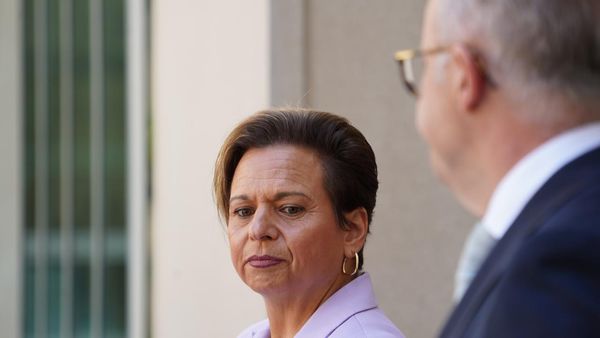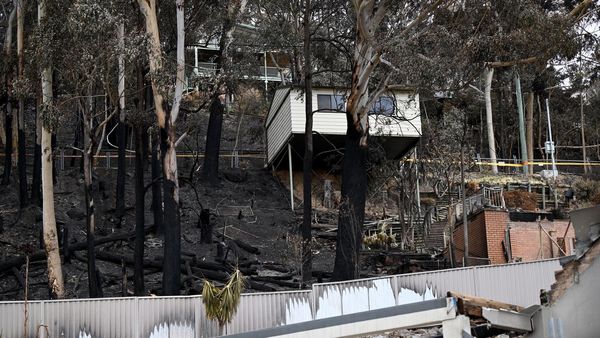
In September 2022, Fawzia al-Otaibi was a week into a trip to her home country of Saudi Arabia, staying with a friend near the Bahrain border, when her phone rang. As soon as she heard the male voice on the other end of the line, she realised that returning had been a terrible mistake.
It was a police officer who, in 2019, had tracked her down and fined her for public indecency after she had posted a video on her Snapchat account, showing her dancing in jeans and a baseball cap at a concert in Riyadh. She and her two sisters, Maryam and Manahel, had become targets in a campaign of arrests, threats and intimidation by the Saudi authorities after they had used their popular social media channels to post about women’s rights. For her, the dancing clip wasn’t a political statement; it was just about sharing a happy moment with her followers.
After the fine, Fawzia left Saudi Arabia for Dubai and hadn’t been back to her home country in three years. She thought the authorities had forgotten about her. She was wrong.
“[The police officer] told me that I needed to come to a police station in Riyadh to get some documentation but that everything would be OK,” she says. “He was trying to make me feel comfortable. He said, ‘You are our daughter. There is no need to bring a lawyer – you can just come alone. We just have some questions for you. When you come you will understand.’”
“I just knew I had to flee,” she says. She got into a car and quickly crossed the border into Bahrain. The next day, when the police realised she wasn’t going to show up, she was immediately issued with a travel ban, prohibiting her from leaving the country. Then she received a text message from her lawyer, who was at the police station: “They’ve got Manahel.”
Last week, nearly two years after her escape, Fawzia receieved another message. This time it was to tell her that Manahel had been convicted of terrorism offences by a court in Saudi Arabia, for uploading pictures of herself with her head uncovered, and social media posts supporting women’s rights. She had been sentenced to 11 years in jail.
Fawzia had been preparing herself for what might come – but when the news struck, the “world became dark before my eyes”, she says.
“For the first time, I hated the fact that I was created a woman in my country. A country that had destroyed me and my family, and turned our lives into an unbearable hell for the crime that we are women who want our right to life. It’s a feeling I can’t even describe.”
A few days before she was sentenced, Manahel had managed to speak to her family for the first time in more than four months, after contact had been cut off without explanation.
“My family said that she was no longer as we knew her,” says Fawzia. “She had a very weak voice and told us that we must forget her and not talk about her any more, because it is her destiny to live like this in jail.”
She told the family that she was being tortured and humiliated: “They were taking revenge on her because she was a woman.” The Manahel who Fawzia knew was adventurous, fearless and outspoken. “I feel that they succeeded in breaking her and killing her dreams and her passion for life. Her soul is no longer what it was.”
Fawzia believes that through their mistreatment of Manahel, the Saudi authorities were also sending her a message: keep quiet or your sister will pay the price. She knew that if it was up to the government, she would be joining Manahel behind bars.
“I believe they are punishing and torturing Manahel because they are unable to punish me,” she says.
In the years since Fawzia’s escape and Manahel’s arrest, Maryam has also been silenced. She realised she was under a travel ban when she tried to leave Saudi Arabia in 2022. Although not imprisoned, she is living with an open arrest warrant over her head and could be picked up by the police at any time.
“They’ve destroyed my whole family because of some tweets about women’s rights,” says Fawzia.
***
When they were growing up in the Saudi Arabian city of Al Ras in the early 2000s, Fawzia and her sisters were seen as troublemakers, she says. Although they were very different – Maryam, the older sister, was maternal and protective; Manahel was adventurous and extroverted; Fawzia quieter and more private – they all refused to accept what they were being taught about the role of women in Saudi society. At school, they found it hard to fit in and started to be seen as disruptive and vocal, always questioning their teachers.
“Everyone was always telling my mother and father to re-educate us until we became like other girls,” says Fawzia. “At school they taught us to hate those who are different. My teachers were always punishing me because we refused to buy into the idea that a man is better than a woman and that we must listen and obey.”
Fawzia says their parents always supported them. But after the police arrested Maryam and Fawzia they became scared and worried for their daughters. The police also told them the behaviour of their daughters was their responsibility and that they would be punished too.
The sisters, Fawzia explains, bonded together and looked to outside influences, ordering books from overseas and dreaming of travelling and being exposed to other cultures. By the time they were in their 20s, they were all active on social media and had amassed tens of thousands of followers between them. In 2016, the al-Otaibi sisters were some of the first to post using the hashtag #IAmMyOwnGuardian, calling for the end of the male guardianship system in Saudi Arabia, which dictated that women needed the permission of a husband, father or male guardian to marry or travel. The rules for travel for women over the age of 21 were relaxed in 2019, but travel bans are still arbitrarily imposed on individuals.
At first, their posts were published anonymously. The Saudi authorities soon began claiming they were a hoax. Maryam was furious at this attempt to diminish their voices and so became one of the first Saudi women to go public and use her real name. She was almost instantly arrested. A few days later, Fawzia was also arrested. Police officers broke down the door of her home and dragged her into the street after she’d posted about her sister’s detention. “It felt more like a kidnapping,” she says.
Manahel started publishing news of Maryam and Fawzia’s detention. The story of their arrest was picked up by international media outlets and went viral. Both sisters were released but Fawzia says that from that point on the authorities began a relentless campaign of intimidation and pressure on their family to try to silence them all.
Fawzia says that a few months later, “they asked our family to kill us”. The authorities argued it would stop the shame they were bringing on the family. “They said, ‘We will help your son do it,’ but my family refused,” she says. “They didn’t forget about us though. They had seen how everyone had called for Maryam’s release. They were just waiting to punish us.”
While Fawzia was living in Dubai, life in Saudi Arabia was becoming increasingly difficult for her sisters. Maryam was forced out of her job at a government ministry and placed under a travel ban. After she posted about what was happening to her, an arrest warrant was issued.
“She said life was a nightmare in Saudi Arabia and told me not to come back,” says Fawzia. “That she was living in constant fear of being arrested and jailed again – but I thought she was suffering from PTSD and exaggerating things.”
Manahel, by this point a certified fitness instructor, seemed less concerned and more determined not to be cowed. She continued to post her support of women’s rights and pictures of herself going about her life to her followers, until her arrest in November 2022.
***
Fawzia describes the weeks after her escape and Manahel’s arrest as a haze of panic. “They had already silenced Maryam and had been waiting for me to be in the country all these years so they could arrest us together,” she says.
Although she had managed to flee, Fawzia didn’t feel safe in Bahrain and travelled to Turkey. “I left all my belongings and life behind in Dubai,” she says. “I had no plans – just to try to be safe.”
It was a time of fear and frantic dialogue with family and lawyers, trying to discover what had happened to Manahel. “I couldn’t sleep,” says Fawzia. “I used to close the doors tightly and didn’t go out much.”
In January 2023, Manahel appeared in court. The charges levelled against her included posting Snapchat photos of herself in a mall without the abaya (a traditional robe) and making social media posts in support of women’s rights. Both of the alleged crimes dated back to 2018.
Manahel’s case was referred to a court specialising in terrorism-related offences. The authorities accused her of leading a propaganda campaign to incite girls to denounce religious principles, and rebel against customs and traditions in Saudi culture. Last week, Saudi officials confirmed in a statement to the UN that Manahel had been sentenced for supposed “terrorist offences”.
Since Manahel’s arrest, Fawzia says, her parents had come under intense pressure from the authorities not to speak about what was happening to their daughters. Maryam, she explains, is isolated and terrified. “She feels she will be disappeared by the regime at any moment.”
Separated from her family and in exile, Fawzia moved to Edinburgh in 2023. She chose the city, she says, so she could feel close to Manahel, who always dreamed of living there. “She read about it in so many books, about the friendly people, the scenery and the history.”
Now, Fawzia’s life revolves around attempting to have Manahel released and Maryam free to travel. She knows the risks of speaking out against the kingdom and publicising what has happened to her sisters, but is adamant that it is what they would want her to do. “We made a vow after everything that was happening to us that we would defend each other,” she says. She still believes that international pressure could expedite Manahel’s release, “because Saudi Arabia really cares about what people from outside the country say”.
Although Saudi Arabia is attempting to present itself as reformed – the country has recently been named host of a UN commission on women’s rights and is keen on bidding for the next Fifa Women’s World Cup – Fawzia insists that what has happened to her and her sisters is the accurate version of how the regime treats women.
Fawzia’s continued activism on behalf of her sisters – and refusal to be silenced on calling for women’s rights – means that she faces a constant barrage of online harassment and abuse from anonymous accounts, and from Saudi government officials who say she is bringing shame on her family and homeland.
“A lot of women in Saudi wanted to be like us, but they were too scared to talk so waited to see what would happen to us,” she says. “Despite what they have done to our family I will not allow them to silence me and make me into an example – to put off other women who may be wanting to defend and call for women’s rights and speak up against the patriarchal system.
“They don’t want to change the life for women in Saudi,” she continues. “They want to keep their situation secret. They just let the world think they have changed before arresting all the women who asked for the change.”
Whenever she falters, she returns to some of Manahel’s social media posts – those in which her sister wrote about dreaming of freedom for all Saudi women. In one, Manahel wrote: “One day I will leave this place … there will come a day when I will be as I want … yes, a day will come when I whisper to the city that I have sworn to destroy their customs, erase their nonsense, and add colour to the city. Their blackness.”
This, says Fawzia, is what helps her carry on. “I will never be truly happy until I am reunited with my sisters.”







